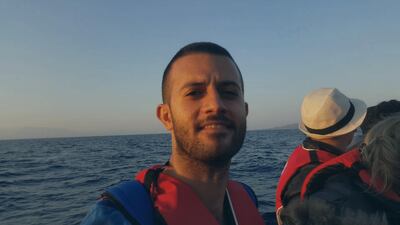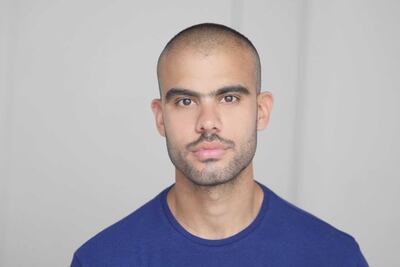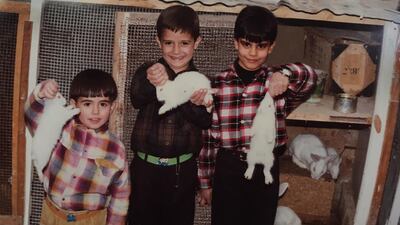When Lebanese filmmaker Wissam Tanios heard his cousins, Jamil and Milad Khawam of Syria, were leaving for Europe in 2015, he reached for his camera as a way to cope. Documenting their departure was meant to stave off an encroaching sense of loss. Little did Tanios know he had begun working on his first feature film.
We Are From There is a documentary that is as much about preserving lifelong relationships as it is about dealing with loss and change. The film, showing at Cinema Akil in Dubai on Wednesday, took five years to make and stitches together recent footage with old family videos, even those taken by a mobile phone from the brothers' journey. The end result is a multi-textural experience that goes against the grain of the stereotyped refugee narrative.
The film had its world premiere at the International Film Festival Rotterdam in January 2020 and won the award for Best Arab Film at the 2020 Cairo International Film Festival. It begins as the Khawam brothers are separately preparing to undertake the perilous journey to the West.
Jamil is leaving Lebanon for Sweden, where he hopes to lead a woodworking business. Milad, on the other hand, has his sights set on Germany. A music teacher in Damascus – a city devastated by war – he wants to establish himself as a professional trumpeter in Berlin.

The two brothers have dissimilar definitions of success and they each want to carve out their own path of obtaining it, even if it means fording through dangerous refugee trails. But behind the camera, Tanios is far from happy at his cousins’ resolve.
"It was like a slap in the face when they told me they wanted to leave," Tanios, 31, tells The National. Jamil and Milad were a vital part of the director's life. Before the war, he'd travel to Damascus – a mere three-hour drive from his hometown of Beirut – to spend the summer with them.
As children, the three boys were inseparable. They kept pet rabbits together and played hide-and-seek in the family carpentry workshop, crouching behind panels of wood as the seeker counted backwards from 10. As they got older, they began to help around the workshop, making classroom benches, dining tables and chairs.

Some of Tanios’s most treasured memories are with his cousins. Their departure brought to mind the stinging loss he felt as a child when his father died and as a teenager when he lost his sister. Filming was a way of preserving those happy childhood recollections.
“My survival mode was to take the camera and start filming,” he says. “I understood that at the end of the film, not at the beginning. At first, when you’re filming, these ideas are not very clear to you.”
What drove Tanios to keep the camera rolling – recording video chats and travelling to Stockholm and Berlin to shoot – was that he realised his cousins were in a transitory phase of their lives, something he says was interesting to him as a filmmaker. But it took awhile for Tanios to realise it would all lead to a feature-length film.
“When it all started I shot some scenes and I did a small edit and showed it to some friends. As I saw them weeks or months later, they’d ask me what happened to those scenes. So little by little, I realised ‘oh, OK, I’m making a film. I have to find a producer. I have to look for funds.'”
Tanios is as much a character in We Are From There as his cousins, even if we only see him in the film through old family videos and a translucent reflection caught in the window of a train. He credits his producer Christian Eid and editor Ghina Hachicho for convincing him to have a more active presence in front of the lens.

“I was resisting a lot at first. I did not want to put myself in the film,” he admits. “I had made a short documentary before, about my sister’s death. It went to many festivals, but after watching it myself years later I felt I was talking too much. But, I think, as much as you resist and say you are not talking about yourself, you are talking about yourself through other people."
When he originally shot the film, Beirut was politically more stable. "Now everything is different," he says. "In one of the voiceovers in the film, I say that I can't leave now because I see what my cousins are losing and I don't want to go through what they are going through. But now, with everything that's happening, I understand what they used to tell me. I remember Milad telling me that Damascus no longer reflects him and that's why he had to leave. I understand that feeling now."
Tanios was adamant to end the film on a bright note, however. The film, he says, is meant to upend the narrative of refugees being victims. Instead, he wanted to showcase their successes.
“I wanted to show that it’s not only about the downs, but also the ups. The film is about hope and perseverance.”
Tanios says his cousins have been doing well for themselves since the film's release. Jamil is due to get his Swedish passport this summer, whereas Milad has released his debut album To The West.
We Are From There has a busy year ahead, Tanios says, with the film expected to appear in a number of international film festivals.
When asked what the ‘there’ in the title refers to, the filmmaker says: “It’s not a physical place. It’s nowhere, definitely nowhere.”
We Are From There screens at Cinema Akil on Wednesday. More information at cinemaakil.com



